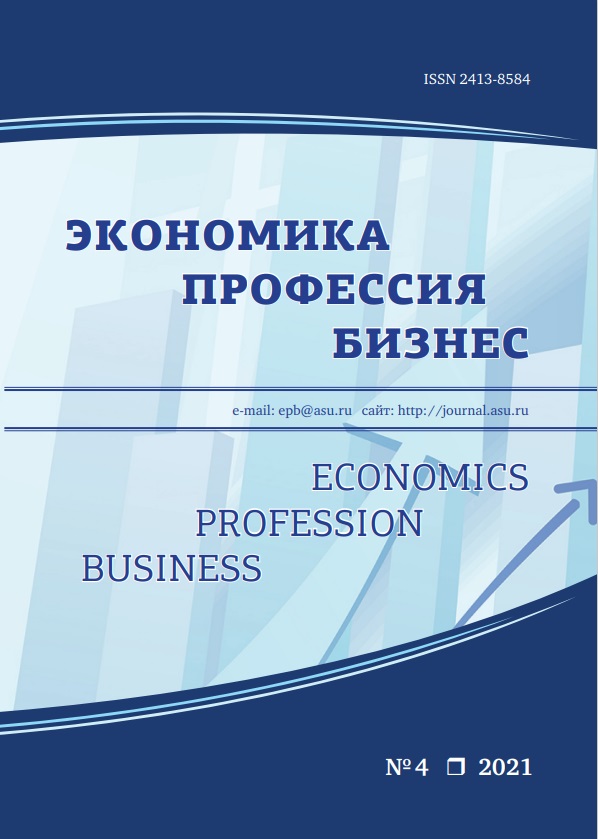TRENDS IN THE DEVELOPMENT OF COOPERATION IN MODERN RUSSIA
УДК 334.735:31 (470)
Abstract
The article presents the results of the analysis of the main trends in the development of Russian cooperation from the point of view of state statistics data, the world experience of the countries of the Asia-Pacific region, data from the website of one of the leaders of the cooperative movement — the Tatar Consumer Union.
Statistical analysis of generalizing indicators (absolute and relative indicators of dynamics, indicators of structure) and graphical representation of data were used as research methods. The available resources served as an information base: published scientific articles, data from the Russian state statistics, digital content of the Tatpotrebsoyuz website.
As a result of the analysis, the most popular areas of cooperation in the countries of the Asia-Pacific region are identified; the direction of the Russian dynamics of development in industrial cooperation (number of members), consumer cooperation (investment in fixed assets), housing and construction cooperation (commissioning of the total area of residential premises, delivery of apartments, the area of apartments rented) are outlined; detailed the development of the Tatar Consumer Union is detailed.
Downloads
Metrics
References
Гумарова Ф. З. Проблемы государственной поддержки малых форм хозяйствования и развития их кооперации в АПК Республики Марий Эл // Современные исследования основных направлений гуманитарных и естественных наук: материалы Международной научно-практической конференции / под ред. И. Т. Насретдинова. Казань, 2017. С. 290-293.
Жилина Н. Н., Шамсутдинова М. Р. Управление бизнес-процессами потребительских кооперативов в условиях «цифровизации» экономики // Экономика и управление: проблемы, решения. 2020. Т. 2. № 5 (101). С. 44-47.
Макарова Е. С., Наширванова Я. Ф., Гатина Э. А. Конкурентоспособность кооперативных организаций в сфере торговли: направления исследования // Экономика и управление: проблемы, решения. 2020. Т. 1. № 9 (105). С. 98-104.
Наширванова Я. Ф., Макарова Е. С., Елесин Е. Ю. Методика оценки инвестиционной привлекательности кооперативных организаций // Экономика и управление: проблемы, решения. 2020. Т. 2. № 9 (105). С. 10-16.
Урядникова М. В. Использование возможностей потребительской кооперации в продовольственном обеспечении населения // Вестник Российского университета кооперации. 2020. № 4 (42). С. 95-98.
Марков Ю. Г. Не хватит ли плестись в хвосте // Наука в Сибири. 22 февраля 2012 г. № (2843). URL: http://www.nsc.ru/HBC/hbc.phtml?15+624+1/ (дата обращения: 30.06.2021).
Долгих О. С., Вахнина Т. Н., Кривдина О. А. Кооперативный сектор в странах АТР // Вестник Алтайской академии экономики и права. 2019. № 6-1. С. 52-62. URL: https://vaael.ru/ru/article/view?id=591/ (дата обращения: 30.06.2021).
Российский статистический ежегодник. 2019: стат. сб. / Росстат. М., 2019. 708 с.
Регионы России. Социально-экономические показатели. 2020: стат. сб. / Росстат. М., 2020. 1242 с.
Объемные показатели деятельности // Сайт Татпотребсоюза. URL: https://tps.tatarstan.ru/hist2.htm/ (дата обращения: 1.05.2021).
REFERENCES
Gumarova F. Z. Problems of state support of small forms of management and the development of their cooperation in the agro-industrial complex of the Republic of Mari El // Modern studies of the main directions of the humanities and natural sciences. Materials of the international scientific and practical conference / ed. by I. T. Nasretdinova. Kazan, 2017. Pp. 290-293.
Zhilina N. N., Shamsutdinova M. R. Management of business processes of consumer cooperatives in the conditions of “digitalization” of the economy // Economics and management: problems, solutions. 2020. Vol. 2. No. 5 (101). Pp. 44-47.
Makarova E. S., Nashirvanova Ya. F., Gatina E. A. Competitiveness of cooperative organizations in the field of trade: research directions // Economics and management: problems, solutions. 2020. Vol. 1. No. 9 (105). Pp. 98-104.
Nashirvanova Ya. F., Makarova E. S., Elesin E. Yu. Methodology for assessing the investment attractiveness of cooperative organizations // Economics and management: problems, solutions. 2020. Vol. 2. No. 9 (105). Pp. 10-16.
Uryadnikova M. V. Using the possibilities of consumer cooperation in the food supply of the population // Bulletin of the Russian University of Cooperation. 2020. No. 4 (42). Pp. 95-98.
Markov Yu. G. Is it not enough to drag in the tail // Science in Siberia. February 22. 2012. No. (2843). URL: http://www.nsc.ru/HBC/hbc.phtml?15+624+1/ (date of access: 30.06.2021).
Dolgikh O. S., Vakhnina T. N., Krivdina O. A. The cooperative sector in the Asia-Pacific countries // Bulletin of the Altai Academy of Economics and Law. 2019. No. 6-1. Pp. 52-62. URL: https://vaael.ru/ru/article/view?id=591/ (date of access: 30.06.2021).
Russian Statistical Yearbook. 2019: stat. sat. / Rosstat. Moscow, 2019. 708 p.
Regions of Russia. Socio-economic indicators. 2020: stat. sat. / Rosstat. Moscow, 2020. 1242 p.
Volume performance indicators // Website of the Tatpotrebsoyuz. URL: https://tps.tatarstan.ru/hist2.htm/ (date of access: 1.05.2021).
Economics Profession Business is a golden publisher, as we allow self-archiving, but most importantly we are fully transparent about your rights.
Authors may present and discuss their findings ahead of publication: at biological or scientific conferences, on preprint servers, in public databases, and in blogs, wikis, tweets, and other informal communication channels.
Economics Profession Business (EPB) allows authors to deposit manuscripts (currently under review or those for intended submission to EPB) in non-commercial, pre-print servers such as ArXiv.
Authors who publish with this journal agree to the following terms:
- Authors retain copyright and grant the journal right of first publication with the work simultaneously licensed under a Creative Commons Attribution License that allows others to share the work with an acknowledgement of the work's authorship and initial publication in this journal.
- Authors are able to enter into separate, additional contractual arrangements for the non-exclusive distribution of the journal's published version of the work (e.g., post it to an institutional repository or publish it in a book), with an acknowledgement of its initial publication in this journal.
- Authors are permitted and encouraged to post their work online (e.g., in institutional repositories or on their website) prior to and during the submission process, as it can lead to productive exchanges, as well as earlier and greater citation of published work (See The Effect of Open Access).









